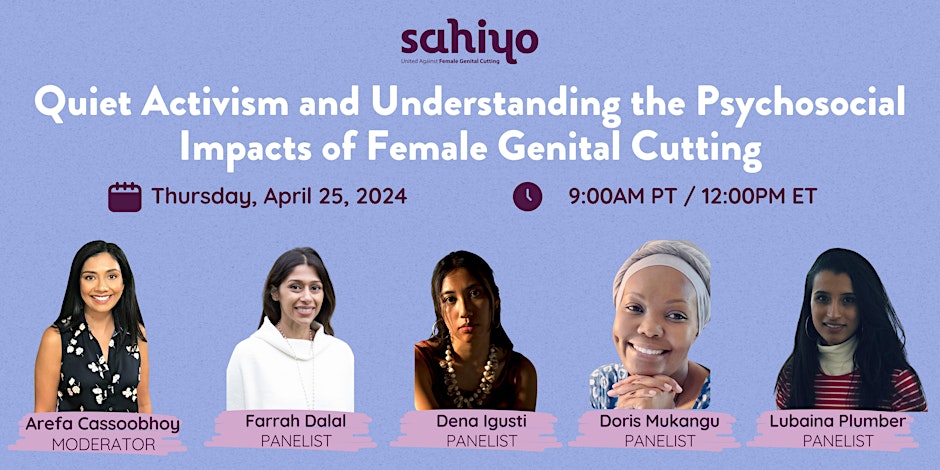A Recap: Public Screening of the Voices 8th Cohort Digital Stories

On March 27th, we hosted a screening of nine digital stories as part of the 8th cohort of the Voices to End FGM/C program. This gathering showcased the powerful narratives of survivors, allies, and advocates committed to ending female genital mutilation/cutting (FGM/C). The discussion was moderated by Aries Nuño, Sahiyo’s Training and Technical Assistance Coordinator, Amy Hill from Silence Speaks, and Orchid Pusey from Asian Women’s Shelter, who are from partner organizations in this initiative. We were also joined by Jeniffer Dias and Gugu Makhari, participants from the latest workshop, who were invited to shed more light on their personal stories and continued efforts in addressing FGM/C. The event was well attended, with about 15 participants engaging deeply with the stories presented. Attendees expressed their appreciation for the storytelling, noting one story as “very powerful and engaging” and another as “beautifully tender and fierce.” The authenticity and bravery of the storytellers were frequently highlighted, with one story where it was described that “this practice did not make me a woman, I am doing that,” a quote that resonated strongly with the audience. With a few storytellers, whose home country is The Gambia, a conversation was sparked about the government’s current attempt to repeal the ban against FGM/C. Noting the importance that survivors should be driving the narrative given their personal experiences with FGM/C and motivating the changes seen in legislation. Feedback underscored the event as a warm and welcoming environment where personal and challenging topics could be shared safely. Many thanked the storytellers for their courage and for being “cycle-breakers,” changing the future for the next generation of girls. We are grateful for the continued engagement and support from our community, which fuels our mission to end FGM/C. We look forward to more such impactful events and thank everyone who shared their stories and those who came to listen. Applications are closing soon for our Voices to End FGM/C 2024 Workshop. To learn more about this opportunity, please visit our website and apply here! Deadline is April 15th.
Presenting “Quiet Activism and the Psychosocial Impacts of Female Genital Cutting”

Event Overview Join us on April 25, 2024, at 12 PM EST for an enlightening webinar titled “Quiet Activism and the Psychosocial Impacts of Female Genital Cutting.” We are honored to feature speakers Arefa Cassoobhoy, Doris Mukangu, Farrah Dalal, Dena Igusti, and Lubaina Plumber, who will share their insights on leveraging quiet activism to navigate and transform the psychosocial landscape of FGC. During this webinar, you will be able to participate in a discussion about the diverse experiences of navigating the psychosocial landscape of FGC and advocacy work. Through shared stories and discussions, we aspire to showcase the transformative power of quiet activism. We’ve seen firsthand the profound impact of taking a personal stand, and we hope to empower attendees to appreciate the significance of their contributions to the movement against FGC. This webinar is an open invitation to anyone interested in understanding the broader impacts of FGC and the role of activism in driving change. Whether you are a survivor, activist, or someone interested in learning more about FGM/C, your presence will enrich the conversation. Register Today! A note from Sophia Jones, Sahiyo Events and Programs Intern When discussing the implications and outcomes of Female Genital Cutting (FGC) there is often an emphasis on the physical outcomes. However, the implications of FGC are wide and varied. Experiences of “othering,” emotional suppression, and the development of psychiatric disorders such as depression, anxiety, and post-traumatic stress disorder highlight the complex aftermath of FGC. This complexity extends to families who challenge cultural norms by rejecting FGC, facing societal marginalization for their decision. Against this backdrop, we invite you to show solidarity and learn more about “quiet activism”—individual actions that contribute to ending FGC, often without public acknowledgment. This form of activism, embracing everything from personal conversations to advocating within families, or artistic expressions that spark meaningful dialogue, represents powerful acts of change.
